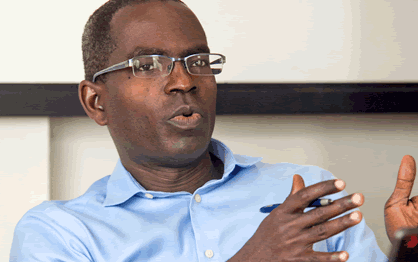African leaders must focus on perfecting character – Dr Awuah

Dr Patrick Awuah, President of Ashesi University has urged fellows of the Young African Leaders Initiative’s Mandela Washington Fellowship, to focus on perfecting their character since their characters determined the destinies of nations and organisations.
He said the character of Africa’s leaders defined the character of their nations, which in turn, determined the destinies of the nations.
Giving the keynote address at the opening of the Mandela Washington Fellowship West Africa Conference in Accra on Wednesday, Dr Awuah noted that it was critical for leaders to start out thinking not only about their personal interests but about the common good.
“…that we begin by not thinking only about our knowledge and our skills, but focus on our character, that we think not only about the intellectual capabilities in the organisations that we run but about the cultures of the organisations we run,” he stated.
Drawing on lessons he had learnt practising the five guiding principles of martial arts (Shotokan Karate dojo kun) over the past 30 years, namely: Seek Perfection of Character, Be Faithful, Endeavour, Respect Others, and Refrain from Violent Behaviour.
Dr Awuah said the character of leaders trickled down to the nation and became the destinies of the nation and said the affirmation of the principles had stayed and helped him, not only in being fit but also in other parts of his life.
He explained that it was important to always seek perfection of character as perfection in itself was impossible and difficult to define. Values that formed character such as humility, patience, courage, loyalty, honesty, generosity, among others, were difficult to define, thus seeking to perfect them will transform the leader and people around them.
He also stressed the need for leaders to respect others, including their opponents as well as themselves and refrain from violent behaviour.
This, he explained, meant refraining from violent thoughts, actions, habits and formed character, which determined their destiny.
He also the need for Africa to build its human capital as it was the most important thing to focus on for any leader in Africa. He said this was important because societies did not advance on the basis of raw materials, but on the basis of human endeavour.
“So to the extent that we can enhance the capabilities of all Africans, then we will be a transformational continent.”
Mr Robert Porter Jackson, Ambassador of the United States to Ghana, said the MWF could help to transform the Africa continent.
He said while transforming Africa would not be an easy task, ‘leaders were those who refused to give up in the face of challenges or obstacles and who searched for solutions’.
He said the fellows were in the position, to take advantage of innovation to address the many economic, social, political and technological challenges that Africa faced.
“Innovation is what is needed to change the face of the continent. Fortunately, as young people, you are almost hard-wired to be more receptive to innovations-to new ideas and procedures- than those of us who have been around a little longer,” he stated.
Ambassador Jackson said the focus of the conference: ‘Promoting Regional Development in Africa through Innovation and Leadership’ was relevant as the United States was keen on promoting regional development, through the USAID and to see West African nations trading more among themselves.
“Without a doubt, united West Africa will have the economic, political and social clout to act and compete on the world stage” he stated.
The two-day conference is the third Mandela Washington Fellowship West Africa regional conference and is aimed at fostering continued networking among fellows, promoting opportunities for ongoing professional development, and involvement in community services.
It also reminds fellows of their roles as change agents and leaders. The MWF is the flagship programme of the Young African Leaders Initiative and brings about 1000 young African professionals from across the continent to US Universities for six weeks of leadership training.
Source: GNA
